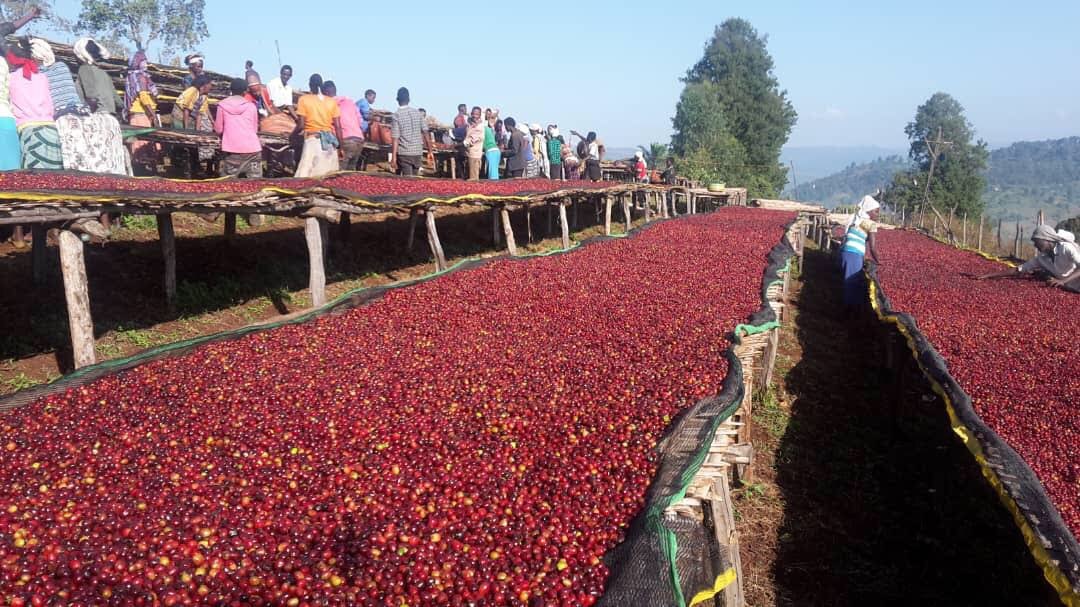
Radar | Oct 05,2024
“Should I kill myself or have a cup of coffee?" said Albert Camus, the late French philosopher and writer, when asked about the beverage. Indeed, there might be no more apt words for the present value of coffee than "the little bean that changed the world."
Coffee, a trophy of the capitalist, is the third most consumed beverage in the world. Ethiopia stands fifth in suppling the world with the most widely used psychoactive drug globally.
Not surprisingly, this translates to great importance for the country that supports 5.6 million farmers in the production of coffee, the genesis of the country's foreign exchange and which covers more than 650,000ha of cultivated land.
Ethiopia, despite being the fifth largest producer and exporter in the world, is a price taker in the international market with a coffee production of 384,000tn, 575pc less than the largest producer and exporter, Brazil.
With more than 400 coffee exporters and 30 import-export companies, the last fiscal year of the country saw a gush with 270,835tn of coffee sold and 854.2 million dollars generated. This represents a 17pc boost in volume and 12pc increase in value from the last fiscal year.
Despite a good performance this year, there are a lot of exporters that seek coffee at a very low price in the international market, according to Hariu Nuru, market information and regulatory director at the Ethiopian Coffee & Tea Authority.
“This is especially witnessed by exporters involved in importing goods from abroad,” he said.
This has led the Authority to issue a directive to combat the everlasting problem of the country's foreign exchange crunch. The directive, named the Minimum Price Coffee Contract System, has been dictating a minimum export price for coffee, which is determined daily depending on the global weighted average prices given to different grades of coffee from different regions, since February 28, 2020.
Since the System was implemented, exporters have had to report the volume and quality of deals and do so within four hours of confirming negotiations. After the contract is cemented, the exporter must deposit the value of the merchandise at the National Bank of Ethiopia. The coffee is then expected to be shipped out within 90 days.
The enacted directive of coffee exports in March saw a surge both in value and volume, 20.6 million dollars and 6,210tn, in absolute figures, respectively.
Some industry players, however, have attributed this increase to sales before the directive was issued.
The Ethiopia Commodity Exchange, which is the biggest platform for commodity sales in the country, works on connecting coffee exporters to farmers.
“The directive was issued after 90pc of the contracts were registered and the impact of the directive will only be seen in the next few months,” said a general manager of one of the top coffee exporters in the country. “We anticipate a negative impact on the sale of commercial coffee.”
However, for the last three months, coffee exports have been seeing a declining trend, especially in value. May and June have registered a contracted export value decline of nine percent and 15pc, respectively.
This is despite the fact that April to July are the arrival months for coffee harvested between October and February. In the case of April, the export of coffee has shown a slowdown of 15pc in value and 6.2pc in volume as compared to the previous month.
The decline for the month of April is due to delays in the shipment of the coffee for 15 days due to Chinese workers catching the Novel Coronavirus (COVID-19) at Ethio-Dijbouti Railways, according to Hairu.
“In addition, the price of coffee in the international market has been declining, and this has led buyers to hesitate to buy Ethiopian coffee,” he said.
Buyers, however, say otherwise.
“We want to buy the coffee, but the price is too erratic,” said a country representative for an international coffee trading company. “We're worried.”
Exporters also have mixed feelings about the impact of the directive on the market, in spite of its intentions.
“It has been challenging at first to navigate through the new directive, said a source from one of the top coffee exporters in the country. “There is no doubt it has increased the foreign exchange in the country.”
Mullege plc has stopped the export of commercial coffee for the last three months due to the newly issued directive as well, partly because the New York Tea Market, which sets a benchmark price for coffee contracts, has seen its prices decline.
Specialty coffee, which is the highest grade of coffee available, is weighted more for its quality than the price. However, specialty coffee represents only 20pc of the coffee market in the country. The fifth largest coffee exporter, Mullege has also steered its full direction toward this type as well.
“It has been so hard for us to bargain when other exporters who import put out a lower price,” said Assefa Dukamo, general manager of Daya Bensa Coffee Export Plc, which exported close to 6,000tn of coffee two fiscal years ago and 5,500tn in the just-ended fiscal year.
The conflicting view on the newly issued directive has also been reflected in the board meeting of the Ethiopian Coffee Exporters Association, which ended without coming to an agreement a few weeks back.
“This will increase the bargaining power of exporters,” said Gizat Worku, general manager of the Association. “It should be understood that the country can’t afford to sell at a lower price. This doesn’t mean many exporters have a problem with it."
Big buyers of Ethiopian coffee have an outlook on the way the price is calculated by agreeing to a minimum price by weighing the global price only.
“It needs further study to set a price,” said Adane Gudina, country representative of Sucafina Coffee Trading Company, which is based in Switzerland. “The issue isn’t issuing a floor price but rather all the pertinent factors that aren’t factored in."
Setting a price by just looking at the global price is looking at only one aspect, argues Adane. The government needs to consider the cherry price, the Ethiopian Commodity Exchange (ECX) price and domestic coffee prices; and the supply chain cost from farmer to ECX needs to be analysed as well, he said.
Nonetheless, the directive is not the only factor affecting coffee exports. The Novel Coronavirus has also added a bundle of problems to exporters.
Speciality coffees, which are often served in cafes and hotels, have been affected by the virus.
After March, there has been a slowdown in the international arena, according to Tesgaye Anebo, general manager of Sidama Coffee Farmers Cooperative Union, which was established in 2001 and has 80,000 farmers under its wing with an annual production of 8,000tn.
The pandemic, which has knocked down the doors of every sector, has also disrupted coffee consumption with lockdowns in most parts of the world.
The International Coffee Organisation showed in its recent study that for every one percent drop in the global GDP, there is a 0.95pc drop in coffee consumption.
The problem for coffee exporters does not lie only with the lower price of Ethiopian coffee in the international arena, according to Senshaw Tamiru (PhD), a country economist at the International Growth Centre, a global research firm.
The cherry price of the coffee at the farmer’s level has been surging for the last two years. In the last harvesting season, the average cherry price of coffee was 15 Br a kilogram, whereas this year it hit 25 Br a kilogram. Simultaneously, the commodity has shown a high surge of sales at ECX.
One-third of the coffee exported from Ethiopia is typically washed coffee, while the remaining is unwashed natural coffee.
In the case of washed coffee, red cherries are harvested and then need to be processed immediately in washing stations. Farmers mostly sold the red cherries in November and December 2019, and they have enjoyed the high price at the end of last year. While global coffee prices spiked during the last harvest season, they fell back rapidly in January.
“This is an artificial increment,” said Zerihun Kemiso, president of the Southern Region Coffee Supplier Association. “This puts in doubt the sustainability of the crop for farmers.”
Seneshaw also agrees with Zerihun. This has led to a ballooning effect in the domestic market with an average price of 150 Br a kilogram of coffee sold locally, according to Zerihun.
“The domestic market issues more prices than the international market, and it’s not balanced," added Zerihun.
Ethiopia’s local consumption of coffee is close to half of the production. With the domestic price rising, industry players have shown their fear of good quality coffee being sold in the local market, which thus decreases the volume for export.
“We aren’t saying don’t drink, but rather the country is in need of foreign exchange," said Adane. “The illicit trade of coffee, in Mercato especially, needs to be looked at by the government.”
Price, quality and consistency are what the government and stakeholders need to straighten out in the country, recommended Seneshaw.
"Washed coffee has close to a 20pc premium value in the international market; however, since the process is laborious, farmers opt for dried natural coffee, and these are the kinds of issues the government needs to work on," he said.
PUBLISHED ON
Jul 18,2020 [ VOL
21 , NO
1055]

Radar | Oct 05,2024

Fortune News | Jun 29,2019

Fortune News | Aug 10,2019

Sponsored Contents | Apr 04,2022

Fortune News | Aug 09,2025

Dec 22 , 2024 . By TIZITA SHEWAFERAW
Charged with transforming colossal state-owned enterprises into modern and competitiv...

Aug 18 , 2024 . By AKSAH ITALO
Although predictable Yonas Zerihun's job in the ride-hailing service is not immune to...

Jul 28 , 2024 . By TIZITA SHEWAFERAW
Unhabitual, perhaps too many, Samuel Gebreyohannes, 38, used to occasionally enjoy a couple of beers at breakfast. However, he recently swit...

Jul 13 , 2024 . By AKSAH ITALO
Investors who rely on tractors, trucks, and field vehicles for commuting, transporting commodities, and f...

Oct 25 , 2025
The regulatory machinery is on overdrive. In only two years, no fewer than 35 new pro...

Oct 18 , 2025
The political establishment, notably the ruling party and its top brass, has become p...

Oct 11 , 2025
Ladislas Farago, a roving Associated Press (AP) correspondent, arrived in Ethiopia in...

Oct 4 , 2025
Eyob Tekalegn (PhD) had been in the Governor's chair for only weeks when, on Septembe...